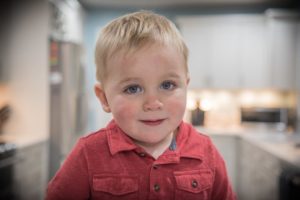
He greets a visitor with a smile, takes an imaginary call on a toy phone, joins his 7-year-old sister Presley for some forward rolls on the tumbling mat in his family’s living room, then hurries off to push a toy lawn mower across the floor.
At 2, Ellensburg’s Hunter Rogala, who weighed in at 9 pounds 10 ounces at birth, looks the picture of good health – and most of the time he is.
“He’s our chunky monkey. He’s got linebacker written all over him,” his father Josh Rogala says with a laugh.
That doesn’t mean Hunter hasn’t given Josh and his wife Sarah panicked moments along the way.
Hunter was three months old when he developed a serious respiratory infection and began struggling to breathe. “He was turning blue,” Josh says recalling how he and Sarah rushed Hunter to the emergency room at KVH Hospital where Hunter was diagnosed with Respiratory Syncytial Virus (RSV), the most common cause of lower respiratory infections in children less than one year old.
Given fluids and medication to reduce inflammation via IV, Hunter also got treatment to open his airways. But staff told the Rogalas that Hunter needed to be in a bigger facility – one that specialized in treating children – and he was transported to Seattle Children’s Hospital.
“We appreciated that they immediately told us he needed to be in a larger hospital,” Sarah says. “There was absolutely no hesitation about sending him somewhere else.”
A few days later, Hunter was home for his first Christmas.
By late January, though, he was back in the emergency room, this time for pneumonia. Then came the day Josh, who works as a wildlife biologist, got a call from Hunter’s daycare saying Hunter had a fever. “I picked him up and immediately took him to the doctor,” Josh says. “I was holding him when he suddenly had a seizure. I’ve seen seizures before but seeing your baby have one is another thing.”
The pediatrician diagnosed Hunter with a febrile seizure caused by an ear infection and prescribed antibiotics. “After that,” Sarah says, “whenever he had a fever we worried.”
Fast forward to August 2016. Josh was just home from work, barefoot and cleaning out his vehicle. Sarah, a social services supervisor for DSHS, had picked Hunter up after work, noticed he felt a little warm, given him Tylenol and was holding him when he suddenly “flopped over” and began seizing.
“We were counting minutes. With febrile seizures, you’re supposed to go the emergency room if they last more than four minutes,” says Sarah, her emotions visible as she recalls that day.
Barefoot, Josh drove the family the short distance from the family’s home to the emergency room as Presley, terrified that Hunter would die, yelled questions.
Diagnosed with a febrile seizure and an ear infection, Hunter got medication to bring his fever down, started oral antibiotics and was happily coloring by the time he was discharged.
“They got us in immediately,” Sarah says. “The nurse was wonderful, totally calming, totally gentle. Everyone was wonderful.” That includes the male nurse who calmed Presley by taking her under wing and pretending that she was his helper.
There’s no question Hunter has given them “stress – and some medical bills,” the Rogalas say. He’s also given them something else: an appreciation for having an emergency department close to home that delivers high quality care and real compassion.
“I’m happy we live close by,” Sarah says. “I think we’ll stay where we are.”